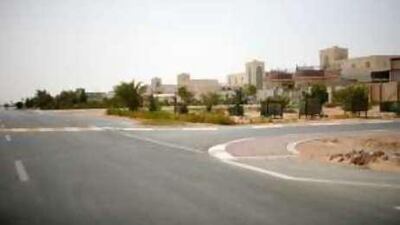ABU DHABI // Skilled expatriates are searching for affordable accommodation in isolated corners of Abu Dhabi in response to the capital's housing crisis. Priced out of a housing market that is experiencing an unprecedented shortage of vacant homes, consultants, architects and teachers from Europe and North America are being squeezed out of Abu Dhabi island and surrounding areas into desolate communities that lack basic services. Suburbs that line the Abu Dhabi to Dubai motorway, such as Shahama and Al Rahba, have become popular among expatriates for their relatively low living costs. But even in these areas rents have soared.
"Most of the people just don't want to pay outrageous money in Abu Dhabi anymore," said Vera Zikic, 49, a mother of two from the former Yugoslavia who works in the transportation sector in Abu Dhabi. She and other expatriate professionals have moved out of the capital into Al Falah and Shamkha - housing developments occupied mainly by Emiratis - about 40km beyond Abu Dhabi on the sandblasted motorway to Sweihan.
Located tens of kilometres from hospitals, markets and cinemas, Ms Zikic said services and basic amenities in these cities were seriously lacking. The nearest medical facility was about 20km away in Bani Yas. Police patrols were scant in areas where she walked alone at night, she said, while an absence of supermarkets that sold basic commodities forced her to drive to the distant Carrefour market on Airport Road in Abu Dhabi.
"I end up having to drive to Abu Dhabi every day for bread and for doing other things, like picking up the kids. And in the almost two years since I've been here, I've seen two police cars." She would, however, rather risk living in a place with meagre police monitoring and spend more on petrol for her drive to work than go bankrupt paying rent in Abu Dhabi, she said. She pays Dh50,000 a year to rent a 125 square metre building, which she shares with her two teenage children. The home was once used as a traditional majlis for the adjacent villa.
In comparison, the annual rent for two-bedroom flats on the Corniche ranges from Dh180,000 to Dh194,400, according to a study published in June by Asteco, a UAE-based property services company. Average rents in the city centre increased by 49 per cent in the year from June 2007 and nearly doubled in some areas, the company said. Since she had moved to Shamkha from a one-bedroom apartment in Khalidiya, Ms Zikic said several engineers and architects from Abu Dhabi were also in the throes of relocating their families there.
Matt Simmons, a British mechanic at Abu Dhabi Aircraft Technologies, which maintains aircraft at Abu Dhabi International Airport, moved into a majlis in Shamkha with his wife two months ago, paying about Dh60,000 less a year in rent than he had for his shared two-bedroom apartment in the Mina area of the capital. "We're out in the sticks," he said. But, because of the relatively low rents in Shamkha, "at least five of my friends from work started expressing a lot of interest in moving out here since I did".
There was, he said, "practically zero police presence, but we haven't felt any problems - we're comfortable". Andrea Menown, the leasing manager of LLJ Property, said she was aware of expatriate families moving into isolated suburbs, but suggested that their tenancies were not negotiated through professional estate agents. "We are aware that there are houses out there being rented, but sometimes it's questionable ownership and you're just not quite sure who you're renting the property from."
Nevertheless, despite this and the lack of amenities in Shamkha and Al Falah, expatriates are willing to make the move for low-cost housing. "When I tell my friends that there's really nothing out here, like public transportation and supermarkets, they say to me, 'Abu Dhabi has got out of hand. You pay US$100,000 a year in rent - not dirhams, dollars'," said Ms Zikic. "They're insulted by how rents have gone up so much for no logical reason."
However, even rents in Shamkha were climbing, due to the recent influx of expatriates to the area, Ms Zikic said. "When I got here, it was Dh50,000 to rent. But now some of these places go for as much as Dh100,000." But with the city centre's vacancy rate for rentable property estimated at less than one per cent in some popular areas, many residents have little choice but to seek accommodation in remote suburbs.
"People's first choices are the Khalidiya and Corniche areas, but there's next to nothing available there," said Rebekah Savage, of Foundation Property Management, an Abu Dhabi company. "If you're lucky and something gets turned over by the landlord, you're looking at waiting two or three months." Ms Menown said estate agents will go out of the city centre block by block until they find something suitable for their clients.
"People should not be under any illusion that just because you're paying a lot of money for your home, we don't have any difficulty getting it. The situation is atrocious." @email:hnaylor@thenational.ae @email:rditcham@thenational.ae


